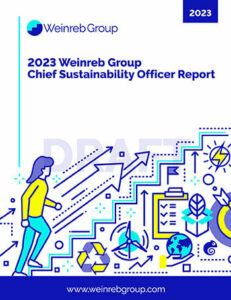
A new international partnership of retail companies aims to aggregate demand by the maritime shipping industry for zero-emission maritime fuels. The Zero Emission Maritime Buyers Alliance (ZEMBA) includes the nonprofit Aspen Institute, Patagonia, European coffee company Tchibo, mega-retailer Amazon and IKEA. The cargo-owner members strive to use zero emissions shipping exclusively by 2040.
ZEMBA’s first step, announced in July, will be issuing a request for proposal in September for a zero-emissions shipping solution to start shipping by 2025 or 2026. It expects shipping lines and fuel suppliers to participate in the RFP, with an eye toward finding a scalable fuel.
Although about 90 percent of global trade travels by sea, the shipping industry contributes 3 percent of global climate emissions, more than air travel. That would make shipping the world’s sixth largest climate polluter, according to Ship It Zero.
Amazon is one of the world’s largest contributors to maritime import emissions, according to a March report by Ship It Zero, a climate and public health campaign.
"Our influence is getting these groups together, and getting out there and ultimately putting an RFP out," said Carl Berger, Amazon’s director of global exports, emerging countries and sustainability. "How do we take the first step there, to get this information out there and say, 'This is what we want to do. How do we all do this and make it happen?'"
How do we take the first step there, to get this information out there and say, 'This is what we want to do. How do we all do this and make it happen?'
By involving well-known retailers, the alliance might sway the major players in maritime shipping that otherwise live outside the public spotlight, according to Eric Leveridge, a corporate climate campaigner for Pacific Environment and lead of Ship It Zero. "People really don’t know who they are," explained Leveridge. "If there isn’t the demand from the world's largest customers, there’s less incentive for the shipping carriers themselves."
ZEMBA launched in March as a project of the organization Cargo Owners for Zero Emission Vessels. It is not the only force pushing shipping decarbonization. A deal in early July by the International Maritime Organization included new emission-reduction targets and proposed a carbon tax for the industry.
Zero emissions solutions by 2025?
Leveridge is optimistic about the potential of ZEMBA to make major progress in a short period of time.
There isn’t a consensus on which fuel or technology will win out. Hydrogen is the cleanest option but difficult to scale, according to Leveridge, making green methanol and ammonia potentially more successful in the short term.
There are two fuels, however, that ZEMBA and Ship It Zero definitely don’t support, and which Leveridge deems "false solutions": liquified natural gas and biofuels.
But hydrogen and ammonia are only zero-emissions fuels if produced using renewable energy, which is often not the case. That’s beginning to change, but it could take decades to scale up. Amazon has contributed funding to Amogy, a sustainable ammonia startup, in an effort to speed up that process, according to Berger.
The Clean Air Task Force estimates that the U.S. market for marine ammonia could reach 47 million tons by 2050. That’s also about how long ammonia would take to reach cost parity with fossil fuels, according to the International Renewable Energy Agency.
PWC estimates that the market for green hydrogen will grow to $300 billion by 2050.
The human factor
While the move to reduce shipping emissions will have obvious climate benefits, Leveridge said it could also help port communities around the world. That’s because when tankers come into port they still emit all types of particulate matter, such as sulfur, while they’re docked, Leveridge said.
Residents near the ports of Long Beach and Los Angeles in California, for example, had a life expectancy eight years lower than the rest of the county, as well as a higher cancer risk, according to Pacific Environment.
Residents near the ports of Long Beach and Los Angeles in California had a life expectancy 8 years lower than the rest of the county.
Ship It Zero is also calling on Walmart, Target and Home Depot to join ZEMBA. They are the top three retailers for shipping import emissions, according to the campaign’s report, which lists Amazon as No. 7 and IKEA as No. 11. "It really matters a lot who the decision makers are," Leveridge said, adding that such an alliance may be a tough sell for retailers because shipping falls under their scope 3 emissions, which they can’t directly control.
Berger is optimistic more major retailers will follow Amazon and IKEA’s lead. "The urgency is now to have these conversations, to get this interest, to attract more members to ZEMBA," he said. "As we get more signing on, that will create more interest, and we’ll continue to have more and more momentum behind it."
- SEO Powered Content & PR Distribution. Get Amplified Today.
- PlatoData.Network Vertical Generative Ai. Empower Yourself. Access Here.
- PlatoAiStream. Web3 Intelligence. Knowledge Amplified. Access Here.
- PlatoESG. Automotive / EVs, Carbon, CleanTech, Energy, Environment, Solar, Waste Management. Access Here.
- BlockOffsets. Modernizing Environmental Offset Ownership. Access Here.
- Source: https://www.greenbiz.com/article/zero-emission-maritime-shipping-gets-boost
- :has
- :is
- :not
- $UP
- 11
- 2025
- 2026
- 2050
- 7
- 8
- 90
- a
- About
- According
- adding
- agency
- aims
- AIR
- All
- Alliance
- also
- Amazon
- Ammonia
- an
- and
- Angeles
- announced
- ARE
- around
- AS
- attract
- BE
- Beach
- because
- Beginning
- behind
- benefits
- Berger
- Billion
- boost
- but
- buyers
- by
- california
- calling
- Campaign
- Cancer
- carbon
- Carl
- carriers
- change
- Climate
- Coffee
- come
- Communities
- Companies
- company
- Consensus
- continue
- contributed
- contributors
- control
- conversations
- Corporate
- Cost
- could
- countries
- county
- create
- Customers
- decades
- decarbonization
- decision
- definitely
- Demand
- difficult
- directly
- Director
- do
- Dont
- Economist
- effort
- emerging
- emission
- Emissions
- energy
- Environment
- Ether (ETH)
- European
- example
- exclusively
- expects
- explained
- exports
- eye
- Falls
- false
- finding
- First
- follow
- For
- Force
- fossil
- fossil fuels
- from
- Fuel
- fuels
- funding
- GAS
- get
- getting
- Global
- global trade
- Green
- Group’s
- Grow
- had
- happen
- Have
- he
- Health
- help
- higher
- Home
- home depot
- How
- However
- http
- HTTPS
- human
- hydrogen
- IEA
- IEEE
- if
- ikea
- import
- in
- Incentive
- included
- includes
- industry
- influence
- information
- Institute
- interest
- International
- into
- involving
- issuing
- IT
- join
- jpg
- July
- Know
- largest
- launched
- lead
- less
- Life
- lines
- Lists
- live
- Long
- los
- Los Angeles
- Lot
- lower
- major
- make
- Makers
- Making
- March
- Marine
- Maritime
- Market
- Matter
- Matters
- May..
- Members
- Methanol
- might
- million
- Momentum
- more
- move
- Natural
- Natural Gas
- Near
- New
- no
- Nonprofit
- now
- obvious
- of
- often
- on
- ONE
- only
- Optimistic
- Option
- or
- organization
- otherwise
- our
- out
- outside
- owners
- Pacific
- participate
- Partnership
- Patagonia
- People
- percent
- period
- plato
- Plato Data Intelligence
- PlatoData
- players
- ports
- potential
- potentially
- process
- Produced
- Progress
- project
- proposal
- proposed
- public
- public health
- Pushing
- Putting
- PWC
- reach
- really
- reduce
- Renewable
- renewable energy
- report
- request
- REST
- retail
- retailers
- Risk
- s
- Said
- say
- scalable
- Scale
- scope
- sell
- September
- Shipping
- Short
- signing
- sixth
- solution
- Solutions
- speed
- Spotlight
- start
- startup
- Step
- Still
- strive
- successful
- such
- suppliers
- support
- Sustainability
- sustainable
- Take
- Target
- targets
- Task
- task force
- tax
- Technology
- term
- than
- that
- The
- the world
- their
- themselves
- There.
- These
- they
- this
- three
- time
- to
- together
- tons
- top
- tough
- toward
- trade
- travels
- two
- types
- u.s.
- Ultimately
- under
- urgency
- use
- using
- Walmart
- want
- we
- WELL
- well-known
- What
- when
- which
- while
- WHO
- will
- win
- with
- world
- world’s
- would
- years
- zephyrnet
- zero











